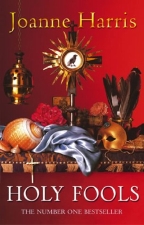Holy Fools
Joanne Harris
Transworld
UK Paperback
ISBN: 0 552 77001 9
384 Pages; £6.99
Date Reviewed: 10th December 2003
Reviewed by: Serena Trowbridge © 2003

REFERENCES
COLUMNS
|
|
|
Holy FoolsJoanne HarrisTransworldUK PaperbackISBN: 0 552 77001 9384 Pages; £6.99Date Reviewed: 10th December 2003Reviewed by: Serena Trowbridge © 2003 |
|
|
REFERENCES |
COLUMNS |
Joanne Harris claims that this book is not the book that her publishers wanted her to write, but the book that she wanted to write. An intriguing claim like this can only help a book's reputation, and Holy Fools more than lives up to this. The evident enthusiasm with which it is written is evident throughout and buoys the reader up despite the unusual subject matter. In tone it is not unlike Harris's immensely popular preceding novels; her tone and use of language is masterful and unmistakable; it also has her hallmark sensory descriptions which draw the reader in, but in theme and subject it is utterly different, and it is a delight to find an author who is so full of variety. Her historical detail is also pleasingly accurate, and this novel has a nice sense of being firmly rooted in its period, taking into account the political situation and the position of the church.
Holy Fools opens in a nunnery, with the story of a young woman, Juliette, now known as Souer Auguste, and her young daughter Fleur. Juliette is escaping from her past, it seems, as a circus performer, and living as a nun to protect herself and her daughter from Guy LeMerle, a mysterious man known as The Blackbird, who, it is suggested, is Fleur's father. When the old Abbess dies, a young girl, Mère Isabelle, and her advisor, Père Columbin, who is none other than LeMerle, replace her. Chaos ensues in the nunnery, as the pair apparently try to restore order but in fact create utter chaos.
The novel is based in fifteenth century France, and Harris herself refers to it as the novel of "the dancing nuns". This may be misleading, as these nuns are not dancing for joy but from hysteria, and the dancing is the indication of the panic that sweeps the nunnery at the subtle instigation of LeMerle. The strong Catholic element of the novel add to the Gothic atmosphere as the hysteria grows, with LeMerle's voice solemnly chanting in Latin above the hubbub. In this novel, as in Chocolat, she asserts that she is not attacking the institution of the church, but of fictional individuals, and I think that reading the book easily dispels any suggestion that this is not the case.
Many of the elements of the traditional Gothic novel are here, following in the footsteps of Ann Radcliffe and Hugh Walpole, not just with the supernatural religious element but also with the manipulative characters and the traditional contrast of innocence and experience. It is a novel that catches at the imagination, and is utterly driven by the machinations of the two central characters, Juliette and LeMerle. In fact the novel is a fascinating character study, since neither character is wholly good or bad, and the changing opinions of the reader make it an exciting read.
It's also a page-turner, which for some reason is never what I expect of Harris's novels despite having found all of them so far to be just that. Her seductive style of writing fools the reader into believing that the plot is just an innocent ploy, and the thrilling climax of the last few pages always takes me delightfully by surprise. By the end of this you know just who the holy fools are; it's a cracking read, and beyond that there's nothing to add.